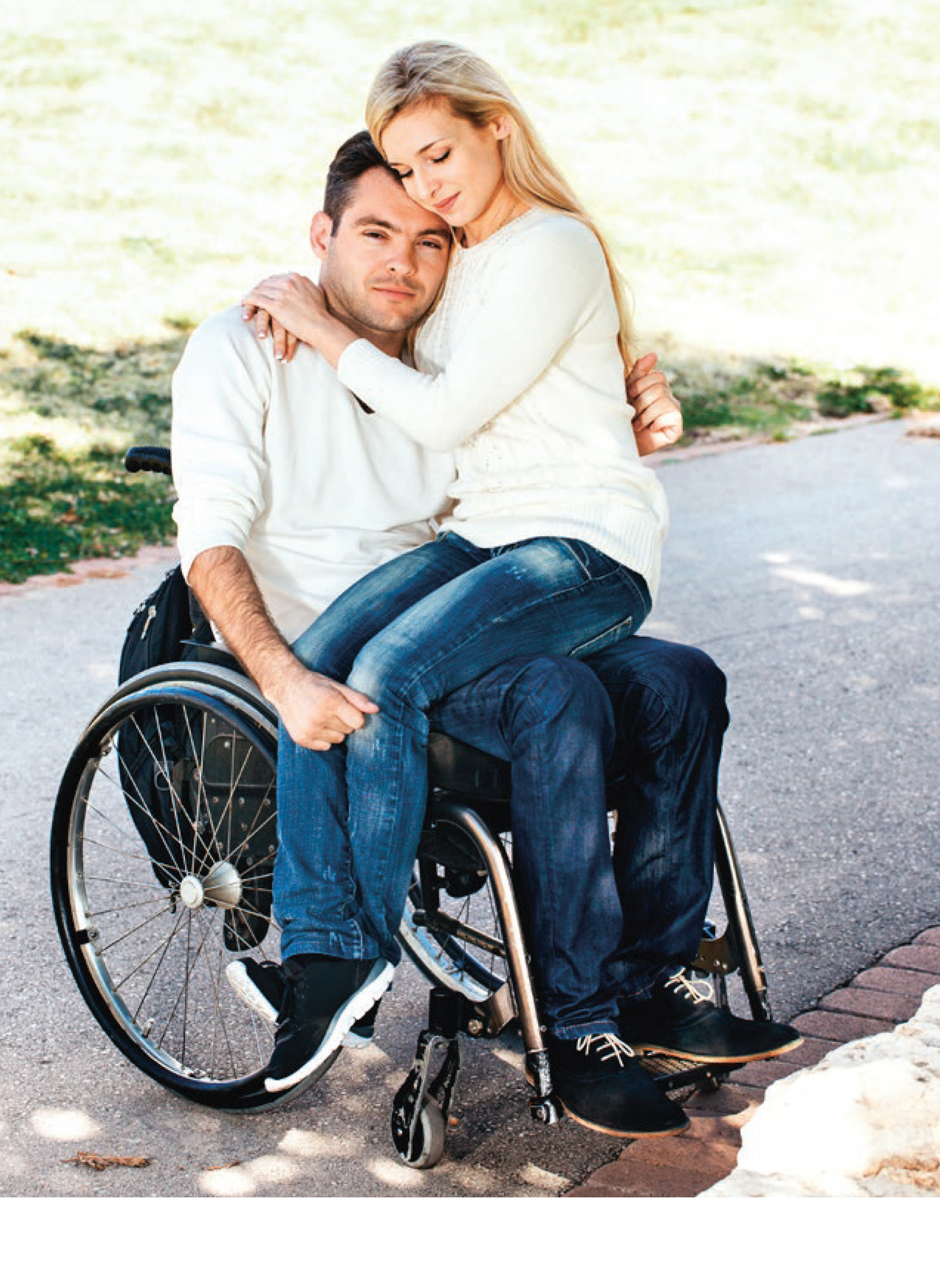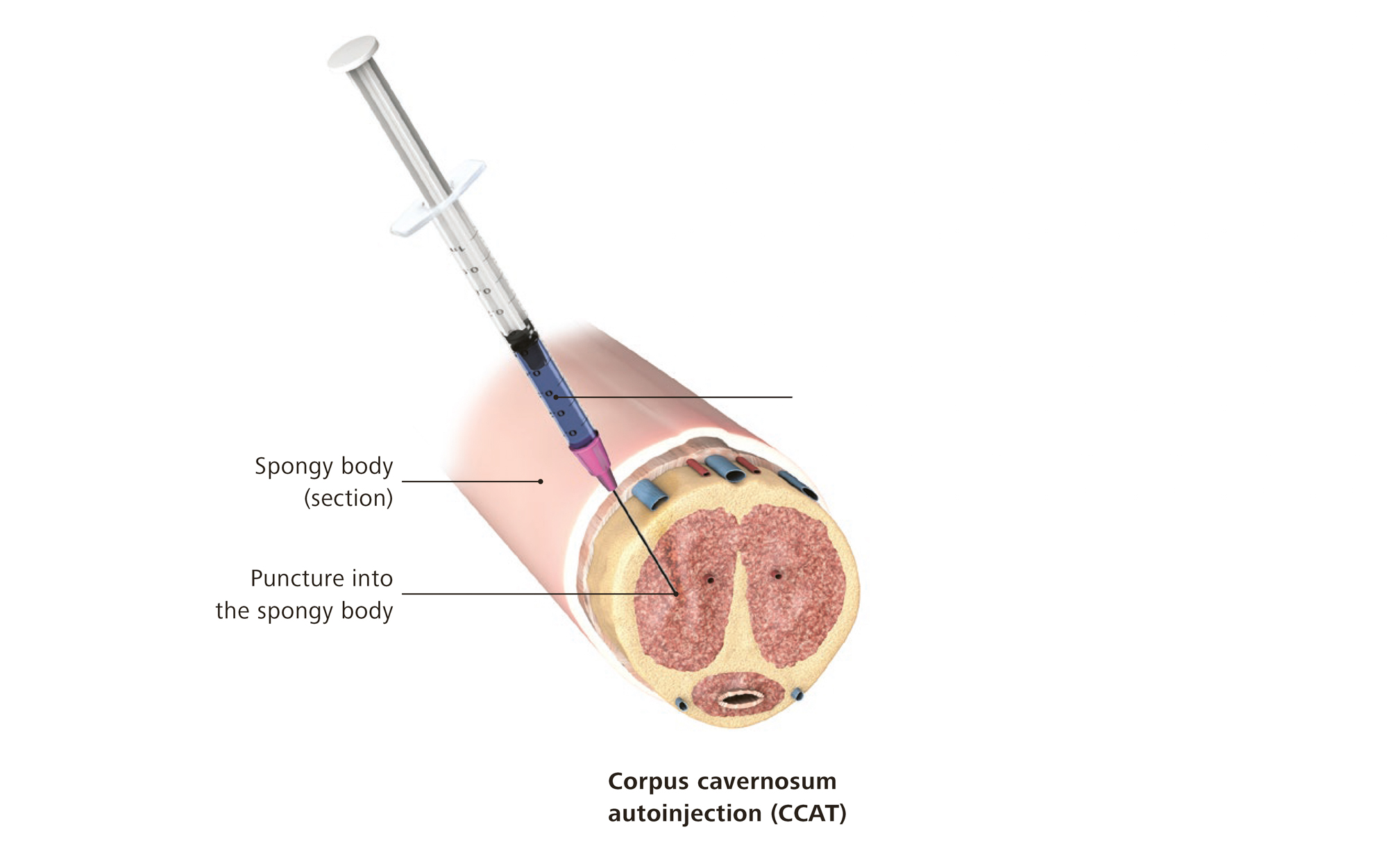
- 6 minutes to read
- 26 July 2019
Erectile dysfunction
Men with spinal cord injury (SCI) may experience erection problems, also known as “erectile dysfunction”. This is the case if it becomes permanently impossible to have an erection that lasts long enough to have sexual intercourse. It depends on the level of SCI and whether it is a complete or incomplete SCI. In general, however, the higher the level of SCI, the greater the likelihood of men being able to have a complete reflexogenic erection and maintain it. Men with spastic paralysis have higher chances of being able to have an erection than men with flaccid paralysis.
Erection problems can show in various ways: Spontaneous nightly or morning erections are usually impossible; the penis does not become hard or hard enough to penetrate the partner despite sexual stimuli; the erection lasts only for a short time and diminishes before or shortly after the man is able to penetrate the partner.

Various types of erection
Psychogenic erection
The force of the attraction and charisma of the sexual partner are efficient psychological stimuli that may lead to an erection. Smells, optical and acoustic stimuli, as well as your own imagination, expectations and sexual desires may also provoke a psychogenic erection. Evaluation of these stimuli takes place in the limbic system of the brain. From there the message goes through the nerves to the spinal cord and finally to the penis which results in an erection. Men with SCI can, in general, have a psychogenic erection if the SCI is below T11 to L2.
Reflexogenic erection
Reflexogenic erection is triggered by physical touch and caressing of the genital area. The stimuli are forwarded to and processed in the reflex centre located in the spinal cord. From there the message goes through the nerve fibres to the penis and triggers an erection.
Reflexogenic erection can occur if the sacral roots and the sacral spinal cord are intact. A reflexogenic erection is only possible in the case of SCI above T11. Since there is no signal coming from the brain (psychogenic erection), permanent stimulation is necessary in order to sustain the erection. For a man, this is often insufficient and does not last long enough for sexual intercourse.
Medical treatment of erectile dysfunction
Medications
Treatment of an erectile dysfunction is mainly done through medication. The best products are currently from the group of PDE-5-inhibitors. Cialis®, Levitra®, Vivanza®, Sildenafil (Viagra®) have been available since 1998 and have shown excellent results in studies that have also been conducted with paraplegics. These drugs only become effective in combination with sexual stimulation.
These drugs must under no circumstances be combined with any nitroglycerin products since this may cause a life-threatening condition where there is not enough blood circulation in the heart. Nitroglycerin products (e. g. in the case of blood pressure crises) are often used for people with SCI suffering from an autonomic dysregulation.
Medication with natural ingredients
There are plants that contain a potency increasing ingredient, for example ginseng or maca, which is a tuber plant from the Andes in Peru. The leaves and bark of the yohimbin tree can help with erection problems.
The active substance of this plant can be found in natural drugs, e. g. maca tuber in Androxan Forte.
Another natural drug that supposedly has potency-inducing effects is Libidoxin, the main active ingredients of which are L-arginine and L-ornithine. Compared to PDE-5-inhibitors, this drug is less effective.
Corpus cavernosum autoinjection (CCAT) for treatment of vasculogenic impotence
Ever since new medication, namely pills, have been available, CCAT is no longer the first choice. For some patients, however, this therapy is still important, especially if the medication does not work or cannot be administered. During this therapy, an active substance (alprostadil) is injected into the penis. The substance spreads throughout the erectile tissue and increases blood flow into the penis by relaxing the muscles, while at the same time decreasing the blood flow out, resulting in an erection. This effect will occur regardless of whether there is sexual stimulation. In tetraplegic people, the partner may be instructed how to perform the injection.
Before using this drug for the first time, the treating doctor will “test the dose”.


Mechanical aids
External vacuum therapy
External vacuum therapy is a mechanical therapy. This erectile aid is a plastic cylinder that is put over the penis and pressed to the base of the penis. A pump helps to create a vacuum which makes blood flow into the erectile tissue and the penis becomes hard. In order to maintain the erection, a penis ring is moved from the cylinder onto the base of the penis to prevent the blood from retreating prematurely from the erectile tissue.
For men with SCI, this solution often does not work well since the penis can bend at the base. The penis ring must be removed after sexual intercourse since the pressure might cause damage or necrosis.
Corpus cavernosum implant
The corpus cavernosum implant (penile prosthesis) is a surgical therapy in which two plastic cylinders are implanted into the erectile tissue bodies. The plastic cylinders can be filled, if necessary, through a pump that is implanted in the scrotum. This hardens the penis mechanically. Risks include infection and mechanical defects. Furthermore, this surgery destroys most of the erectile tissue.
Modified orgasm
The ability to have an orgasm is almost always affected by SCI. The rhythmical, spontaneous muscle contractions that occur during an orgasm may persist longer after SCI and can be unpleasant for the affected person. If the SCI level is above T12, the orgasm is often preceded by spastic reactions in the legs.
In the case of incomplete sensory paralysis, the orgasm sensations can be similar to those before SCI.
People with complete sensory paralysis in the genital area report that it is possible to experience an “orgasm in the head” or an overall feeling of well-being and relaxation similar to orgasms they had before the injury. In this case, imagination, adventurousness and pleasure in experimenting play an important role. Some paraplegics and tetraplegics experience orgasms despite reduced or missing sensitivity.

Advice on the wish to have children
Ejaculation
When ejaculating, various nerves work together. After SCI they often do not work together properly any more and this makes ejaculation problematic. Ejaculation takes place drop by drop or not at all, or is redirected to the urinary bladder (retrograde ejaculation) if the bladder neck muscle does not function.
Fertility
Even after SCI, a man is able to have children of his own. Sexual functions such as erection and ejaculation may remain preserved as well as a sufficient quality of the semen. If these functions are limited or missing, there are various other possibilities for having children. It is generally recommended to inform oneself ahead of time since the biological age of the woman also plays an important role when planning a family.
Intrauterine insemination
Intrauterine Insemination
If there is a sufficient number of mobile sperm, intrauterine insemination (the sperm is transferred directly into the uterus of the woman using a catheter through the cervix) can be undertaken. However, the number of men with spinal cord injuries with a sufficient sperm quality for this method is small.
ICSI
If the sperm quality is low but a few mobile sperm can be found, an intracytoplasmic sperm injection (ICSI) may be used. ICSI is an artificial fertilisation procedure in which a single sperm is injected directly into an egg.
Through assisted ejaculation (see next paragraph) and ICSI, it has become possible for even men with spinal cord injuries to have children, as only one mobile sperm is required per egg. A therapy to increase sperm quality has not yet been found.
Can medication that I am taking every day have an impact on my libido?
Yes, there are medications that are known to decrease the libido. If you think this may apply in your case, it is important that you only change your medication after having talked to your urologist. Do not stop using medication based on your own decision only!
Is medication for the treatment of erection problems paid by my health insurance?
It depends. Usually, in Switzerland the tablets are not paid for; however, the injections (CCAT) are paid for.
Can I consult any urologist if I suffer from erection problems or if my partner and I want to have children?
It is recommended to consult a urologist who is highly experienced with paraplegia. The best thing to do would be to consult your current urologist at the paraplegic centre.

Be the first to comment!